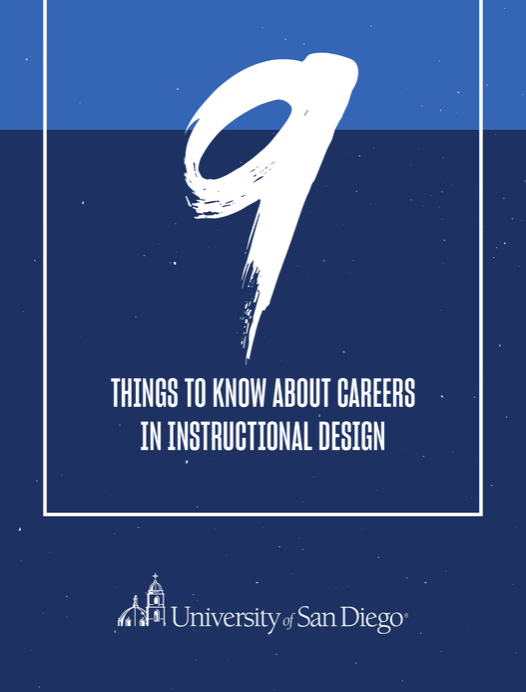While advances in digital technology have set the foundation for an increase in careers related to educational technology, the COVID pandemic secured educational technology as a valued and critical field. The 2020 pandemic brought a paradigm shift as evidenced by 58% of educators now having a more positive view of EdTech as a whole. A whopping 87% of U.S. educators stated that their ability to use educational technology improved during the lockdown.
As more institutions and instructors realize the necessity of EdTech, they also recognize the importance of having personnel who are experienced in EdTech. Nine out of ten teachers reported that they had to spend more time troubleshooting issues with technology as a result of the lockdown. As the need for instructors skilled in handling technology grows, so do the career opportunities for education tech jobs. Job growth for related careers, such as instructional coordinators, also known as a curriculum specialist, and instructional designers are expected to increase by 10% and 6%, respectively, over the next eight years.
If you’re interested in this growing field, you might be curious about which areas are hiring and about the specific responsibilities (and salaries!) of specific positions. Read on for a review of top educational technology jobs.
What is Educational Technology?
Educational technology refers to “technology that usually helps facilitate collaboration in an active learning environment. By using educational technology, educators can create digital, interactive textbooks, gamify lessons, take attendance, assign homework, hold quizzes and tests and get real time results related to teaching material, style and format.”
Whereas technology was once approached as a useful tool to supplement traditional teaching methods, it’s being used more and more to introduce new and innovative means of instruction. Utilizing digital devices such as laptops and tablets can introduce greater flexibility in how curriculum is taught. The internet has also increased access to education, bringing education to more remote locations and allowing instruction to persist through snow days and pandemics alike.
Top EdTech Industries to Work In
The value of EdTech isn’t just limited to schools. Instruction and training is a lifelong endeavor, and many organizations across numerous industries need people who understand how to best pair technology with instruction. Here are five major industries that are hiring for instructional technology jobs:
- Education – If you love to teach or help students learn, then there’s likely no better place than working in education. Depending on your preferences you could find a variety of positions in primary, secondary or post-secondary schools. COVID introduced many students to the world of online learning with a recent survey indicating that 73% of students would like to take online courses post pandemic, this shift in student preference for the online modality may spur the need for more educational technology jobs in education.
- Business – For those that prefer to work in the private, corporate world then there’s a wide array of possibilities as well. You could work with online education platforms such as Blackboard or Coursera. Or perhaps handle education development in a large tech firm such as Apple or Google. Even businesses with no affiliation with education are interested in hiring EdTechs to develop their internal training programs.
- Military – The U.S. armed forces has some of the oldest and most well-known academic institutes in the country, such as the U.S. Military Academy at West Point and the U.S. Naval Academy at Annapolis. The U.S. military is committed to the innovative use of digital technologies and modern educational practices to teach and train its personnel.
- Nonprofits – Perhaps public service is more your calling. Many nonprofit organizations are committed to expanding access to education for underserved and at-risk communities. Consider organizations like Teach for America or Digital Promise if you’d like to reach wider audiences that need EdTech support.
- Government – If you want to help determine what constitutes good EdTech policy and help ensure that best practices are developed for all forms of education, then consider working for the government. State governments set local standards and develop new EdTech initiatives for school districts, while the Office of Educational Technology helps promote access to and understanding of EdTech for the entire nation.
Top Educational Technology Jobs
As the field of EdTech has grown, so have the possible educational technology jobs and career paths. Whether your interest lies in direct instruction, course design, or administration, you can find a position in EdTech that makes use of your skills and experience. Here are nine popular jobs within EdTech
*Salary information sourced from Glassdoor.com. Values are only estimates, exact salary offers will vary based on position, region and years of experience.
- Curriculum Designer/Manager – Average base pay $73,619
Curriculum Designers are responsible for developing educational programs and instructional materials through an understanding of learning theory and technical knowledge. They assist instructors in the presentation of the learning materials and determine if there are additional needs or required adjustments. - Digital Learning Designer – Average base pay $70,189
Digital Learning Designers, sometimes called e-Learning Designers, specialize in the development, delivery and evaluation of educational materials for online or digital environments. They need to stay current on the latest technology and digital learning methodologies to determine what is the best fit for specific courses. - Director of Educational Technology – Average base pay $98,368
Directors of Educational Technology work with department leaders and IT teams to coordinate which digital technologies and assessment tools will be used by an organization. They oversee the training and performance of faculty as well as the development of education technology policies and procedures. - Educational Technologist – Average base pay $62,748
Educational Technologists work collaboratively with faculty and IT teams to determine how to best implement educational technologies. They are responsible for researching and implementing new software and hardware infrastructure, as well as training educators on best practices in how to use technology and collaborate on ways to integrate it with pedagogy. - Media Specialist – Average base pay $56,710
Media Specialists are responsible for procuring and maintaining a school or organization’s audio-visual equipment. They set up equipment and train others on how to use devices for presentations, lectures and meetings. They can also assist in the creation of digital content and ensure that all communications are consistent and on-brand. - Technology Coach – Average base pay $50,908
Technology Coaches focus on supporting the integration of technology within the classroom. They coach educators on how to employ the most effective strategies for utilizing educational technology within the curriculum and in the classroom. They also assist in assessing student learning and provide assistance to students who most need it. - Technology Coordinator – Average base pay $57,048
Technology Coordinators have the responsibility of managing different technology projects, either for an organization or an entire school district. They set up timelines for projects, research appropriate technology, build teams and schedule meetings and check-ins. They supervise the computer education program and use of EdTech throughout different schools. - Technology Integration Specialist – Average base pay $55,065
Technology Integration Specialists determine the best possible means of implementing and using instructional software and educational technology. They work to improve network infrastructures, systems configurations and manage maintenance and upgrades for the systems. They oversee the use of technology across all areas of an organization and troubleshoot issues with hardware and software. - Senior Instructional Designer – Average base pay $90,313
A Senior Instructional Designer develops the framework for training and development programs or courses of study. They work as “project managers,” building and managing educational technology architecture and all aspects of a program – from goals and scope to learning aids and assessment tools.
If you’re interested in exploring some of these educational technology jobs in more detail, visit the U.S. Department of Labor, Employment & Training Administration’s O*NET Online page. Listed positions will have a more detailed breakdown of job openings and salaries by state, as with this page for Instructional Coordinators.
Top Educational Technologies
There are many different technological resources and platforms that are used in EdTech, from basic websites and chat boards to computer-based assessment and virtual learning technologies. Top Tools for Learning compiles a list of 300 of the most popular EdTech tools for every year. If you’re interested in reviewing some of the more popular programs, here’s a short(er) list of resources you can try for free:
- Google Apps for Education: Google Education Fundamentals are a suite of applications free to qualifying institutions including widely popular cloud software like Google Docs and Google Drive. If your school has a paid subscription you may also have access to applications like Workspace for Education Standard, Education Plus, and the Teaching and Learning Upgrade.
- Google Arts & Culture: a huge variety of multimedia educational materials that explore arts and culture via virtual tours of museums, archeological sites and places of cultural importance. The application features high-res artworks, historical timelines and artist biographies.
- Duolingo: this popular language learning app can be integrated with G suite features, allowing teachers to make language learning fun via games and quizzes.
- Quizlet: a tool for teachers to easily create online flashcards and games to assist in the development of custom learning aids. Mostly designed to assist in memorization, Quizlet features 125 million pre-created study sets.
- BrainPOP: an online learning resource for teachers and children of all ages, with thousands of lessons, games, quizzes, videos and more for every subject and grade-level.
- Tynker: Coding for Kids: a self-paced, online learning platform for children that teaches coding for a wide variety of technologies such as apps, games, websites, toys and more.
- Explain Everything: a virtual interactive whiteboard that can be used for teaching, brainstorming, creating animations, journaling and more.
- Zoom: popular video conferencing software that offers additional features like chat, breakout rooms, support for multiple devices and customization through APIs, SDKs and webhooks.
- Slack: a workplace communication platform that allows for the sharing of messages, tools and files, can sync to different apps and is accessible across multiple devices.
- Padlet: an online notice board that allows for the easy sharing of links, videos, images and document files between teachers and students.
- Canva: an online graphic design and publishing tool with a drag and drop interface for simple creation and editing of social media graphics, posters, documents, guides and other visual content.
- Kahoot: a game-based learning platform that allows educators to easily create quizzes and games for students.
- Jamboard: a Google app, Jamboard is a digital interactive whiteboard that allows for online collaboration with the support of handwriting and shape recognition tools.
- H5P: Html-5-Package is a plugin tool that allows users to create, share and reuse HTML5 content and applications.
- Mentimeter: real-time interactive presentation software that allows users to easily add questions, polls, quizzes, slides and images through an online editor.
- GoGuardian: a Chromebook management software designed to give teachers who use Chromebooks for school full control over user activity, web filtering and communication.
Required Skills for Educational Technology Jobs
There are certain general skills that are applicable for any Educational Technology position, whether for EdTech teacher jobs or instructional technology company positions.
- EdTechs should be effective in coaching and mentoring others in how to use technology, and be comfortable in collaborating and communicating with others.
- In addition to established interpersonal skills, EdTechs should have strong verbal and written communication skills and be able to communicate in technical terms across technology and education.
- They should have a broad knowledge of industry standards and best practices in the use of technology in schools, including the International Society for Technology in Education National Technology Standards (ISTE NETS).
- Like in most leadership positions, EdTechs should be trained in critical thinking and have strong problem-solving skills.
For EdTech positions that are more strictly focused on developing and servicing technology, more specific technical skills may be required. These skills can include:
- Basic web development and coding knowledge such as familiarity with HTML, CSS and Javascript.
- Knowledge of using online content management and online learning systems such as Blackboard, Canvas or Moodle.
- Understanding of how computer networks are established, operate, and communicate, with the ability to troubleshoot as needed.
- Advanced programming skills in order to develop software or applications for cloud-based systems or learning platforms.
What Does a Learning Design and Technology Master’s Degree Teach You?
The best programs teach you a combination of theory and practice for both learning design and the implementation of technology. There has been a relatively recent emergence of new advanced degree programs in educational technology that are designed to prepare you to shift into an innovator’s mindset and become a technology leader in educational settings, as well as in government and private industry.
Programs like the University of San Diego’s Master of Science in Learning Design and Technology are structured to impart a comprehensive understanding of the cutting-edge tools used in educational technology, as well as the important underlying educational theories and best practices. USD LDT also covers critically important related issues such as budgeting, legal/ethical considerations, real-world partnership opportunities and educational equity that are essential in inspiring student learning, achievement and creativity.
Educational Technology Career Resources
Interested in exploring your EdTech career options? Check out any of these online resources.
FAQs About Educational Technology Careers
Q: Do I need an advanced degree to work in educational technology?
A: Probably. While some positions may require only a bachelor’s degree and appropriate professional certificates, many of the higher-level (and better-paying) positions require either a master’s degree or comparable level of experience.
Q: What are some potential jobs for someone with an EdTech degree?
A: Beyond the nine positions listed above, other potential careers include:
- Performance Support Specialist
- Interface and Multimedia Designer
- Training Director
- Chief Learning Officer
You can also find a position as an instructor depending upon your area of study and expertise.
Q:What is the average salary for an educational technology job?
A: Average salary can vary considerably. Mid-level positions earn between $50-60K, while higher-level senior positions average over $80K. Location also matters, according to the U.S. Bureau of Labor Statistics, an instructional coordinator in Connecticut can earn an average salary over $90k, while the same position in Louisiana averages around $50k
Generally, EdTech positions tend to earn more on average than positions based solely in education.
Q: Is educational technology a promising career field?
A: Absolutely! Online education is an exponentially growing field and educational technology is continuing to innovate new ways of learning and engaging with instructional material. In many ways, EdTech is the future of education.

![Top Educational Technology Jobs to Consider [+Salary Info]](https://onlinedegrees.sandiego.edu/wp-content/uploads/2022/02/dt_blog_topedtechjobs.png)

![12 Instructional Design Best Practices [+Tips for Success]](https://onlinedegrees.sandiego.edu/wp-content/uploads/2021/07/ldt_blog_idbestpractices-1024x576.png)

